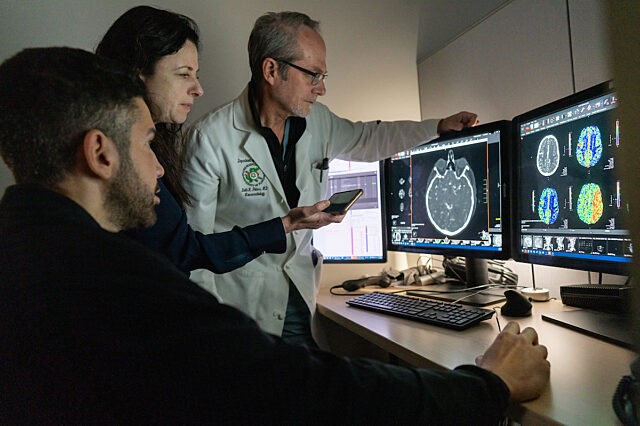The Role of Vascular Neurologists in Treating Stroke: What You Need to Know

Did you know that more than 795,000 people in the United States have a stroke every year?
Strokes are the fifth leading cause of death and a major cause of serious disability for adults. However, early treatment and intervention can improve the chances of survival and recovery. This is where vascular neurologists play a crucial role in treating stroke patients.
In this article, we will discuss the role of vascular health specialists. Continue reading to learn more about the important work they do in treating stroke.
Diagnosing Stroke
One of the primary responsibilities of vascular health specialists is diagnosing stroke. They use a variety of tools and tests to determine if a patient has had a stroke and what type it is. These can include physical exams, imaging studies, blood tests, and more.
Early diagnosis is critical in treating strokes, as certain treatments are time-sensitive. Neurologists must be able to identify the signs and symptoms of a stroke quickly.
This allows them to start treatment as soon as possible. This increases the chances of a positive outcome for the patient.
Administering Thrombolytic Therapy
Thrombolytic therapy is a treatment used to dissolve blood clots that are causing a stroke. It involves administering medication to the affected blood vessels. This helps restore blood flow to the brain.
Timing is crucial when it comes to thrombolytic therapy. It must be given within a certain window of time after the onset of symptoms.
Vascular specialists can assess patients and determine if they are eligible for this treatment. They can also monitor the patient’s response to the medication. This helps them make any necessary adjustments.
Performing Endovascular Thrombectomy
Endovascular thrombectomy is a minimally invasive procedure. It’s used to remove blood clots from larger blood vessels in the brain. This newer treatment option can improve outcomes for certain types of stroke patients.
Vascular neurologists are experts in this procedure and can perform it when necessary. They also monitor the patient’s condition and recovery after the procedure.
Providing Post-Stroke Care
The role of vascular specialists doesn’t end with acute treatment. They also play a crucial role in providing post-stroke care. This includes:
- managing medications
- monitoring for complications
- coordinating rehabilitation services
- addressing long-term effects of the stroke
This is to ensure that stroke patients receive comprehensive care during their recovery. It also helps prevent future strokes.
Educating Patients
Another important role of vascular health specialists is educating patients about stroke prevention. These stroke prevention experts can provide information to reduce a person’s risk of having a stroke. This can include:
- making lifestyle changes
- managing underlying health conditions
- recognizing the signs of stroke
- knowing when to seek medical attention
By educating patients, they can help prevent future strokes. This can have a significant impact on reducing the number of strokes each year.
They also educate patients on the causes of hemiparesis and how to manage its symptoms. This is a common complication of stroke. It can affect a person’s movement and coordination.
Conducting Research
Vascular specialists also conduct research related to stroke treatment and prevention. This helps them develop new and improved methods for diagnosis and care.
Their research helps advance medical understanding of strokes and improve outcomes for patients. It also allows them to stay up-to-date on the latest advancements in stroke treatment.
Continuing Education
As with any medical specialty, vascular specialists must continue to learn and update their knowledge. They attend conferences and workshops to stay informed about the latest research and techniques. This helps them provide the best possible care for stroke patients.
They also take part in ongoing education to maintain their board certification and licenses. This ensures that they are always practicing at the highest level of expertise.
Educating Future Healthcare Professionals
Vascular health specialists play an important role in educating future healthcare professionals. They may teach medical students, residents, or fellows about stroke diagnosis and management. This helps ensure that there will be a new generation of skilled experts.
They may also mentor students who are interested in becoming vascular specialists. This allows them to pass on their knowledge and passion for treating strokes.
Advocating for Policy Changes
Beyond individual patient care, neurologists may also engage in advocacy efforts. This is to promote policy changes that improve health outcomes for stroke patients. This includes working with government agencies to influence legislation related to stroke care.
They may also advocate for increased funding for stroke research. This helps support the development of new treatments and prevention efforts.
Providing Emotional Support
A stroke can be a life-altering event for patients and their families. Vascular specialists can also provide emotional support. They help patients cope with the physical and psychological effects of a stroke.
They may refer patients to support groups or provide counseling themselves. This can improve a patient’s quality of life during their recovery. It can also help them adjust to any long-term changes caused by the stroke.
Collaborating with Other Healthcare Professionals
Vascular specialists also work with other healthcare professionals. This is to provide comprehensive care for stroke patients. This can include collaborating with:
- neurosurgeons
- critical care physicians
- rehabilitation therapists
- speech-language pathologists
By working together, they can create individualized treatment plans. This helps address all aspects of a patient’s health and recovery.
Conducting Neuroimaging Analysis
Neuroimaging is an important tool in diagnosing and monitoring strokes. Vascular specialists can interpret these images and use them to guide treatment decisions. They can also identify any changes in the brain that may indicate a worsening condition.
This is crucial in managing strokes and preventing further damage. It allows for more accurate treatment planning and monitoring of a patient’s progress.
The Importance of Vascular Neurologists
As you can see, vascular neurologists play a critical role in treating strokes. They’re involved in every step of the process, from diagnosis to post-stroke care. Their expertise is essential in improving outcomes for stroke patients.
Remember, early intervention is key in treating strokes. So don’t hesitate to seek help if you suspect a stroke may be occurring. Your neurologist can help you or a loved one get the care needed for the best possible outcome.
Did you find this blog post helpful? If so, feel free to explore more of our blog!



